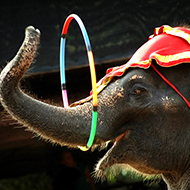Wales votes to ban wild animals in circuses

Members of the Senedd voted 53 votes to zero in favour of the Wild Animals in Circuses Bill.
Welsh parliamentarians have voted unanimously in favour of the Wild Animals in Circuses (Wales) Bill, meaning that it will soon be an offence to use wild animals in circuses, through performance or exhibition.
The decision follows moves to ban the practice in England and Scotland. The Wild Animals in Circuses Act 2019 came into force in England in January this year, while in Scotland the Wild Animals in Travelling Circuses (Scotland) Act 2018 implemented a ban in May 2018.
Members of the Senedd voted 53 votes to zero on Wednesday (15 July) in favour of the Wild Animal In Circuses Bill passing its final stage of legislative scrutiny. The Bill will now go through to Royal Assent and come into effect on 1 Dec 2020.
RSPCA Cymru, which has long-led the campaign for a ban on the use of wild animals in circuses, hailed the decision as 'historic' for animal welfare. Wales will now join an estimated 45 other countries, nations and states to have also acted on the practice.
"This is an historic day for animals in Wales - with the spectre of wild animals being used in travelling circuses set to be consigned to the history books, once and for all,” commented Claire Lawson, RSPCA assistant director for external relations in Wales. "The RSPCA is proud to have long campaigned on this issue - and the strength of feeling in all corners of Wales was clear.
She added: "We're delighted this Welsh Government Bill has now passed its final legislative hurdle; making a hugely important statement concerning how policy in Wales matches societal norms and values towards our fellow living creatures."
The RSPCA has long been concerned about the transient nature of circuses, not to mention the forced training and cramped accommodation that animals have to endure. Previous research by RSPCA Cymru revealed that 74 per cent of Welsh citizens support a ban on wild animals in circuses.
“This Bill will address the ethical concerns of people across Wales by banning the use of wild animals in travelling circuses,” commented environment minister Lesley Griffiths. “The use of wild animals for entertainment in this way is outdated - wild animals are sentient beings with complex needs, and they should not be seen as commodities for our entertainment.
She continued: “I would like to thank all those who have contributed to getting the Bill to this stage, including Senedd Committees and Members for their consideration and scrutiny of the Bill, and the organisations and individuals who took time to provide evidence during scrutiny.”



 The Veterinary Medicines Directorate (VMD) is inviting applications from veterinary students to attend a one-week extramural studies (EMS) placement in July 2026.
The Veterinary Medicines Directorate (VMD) is inviting applications from veterinary students to attend a one-week extramural studies (EMS) placement in July 2026.